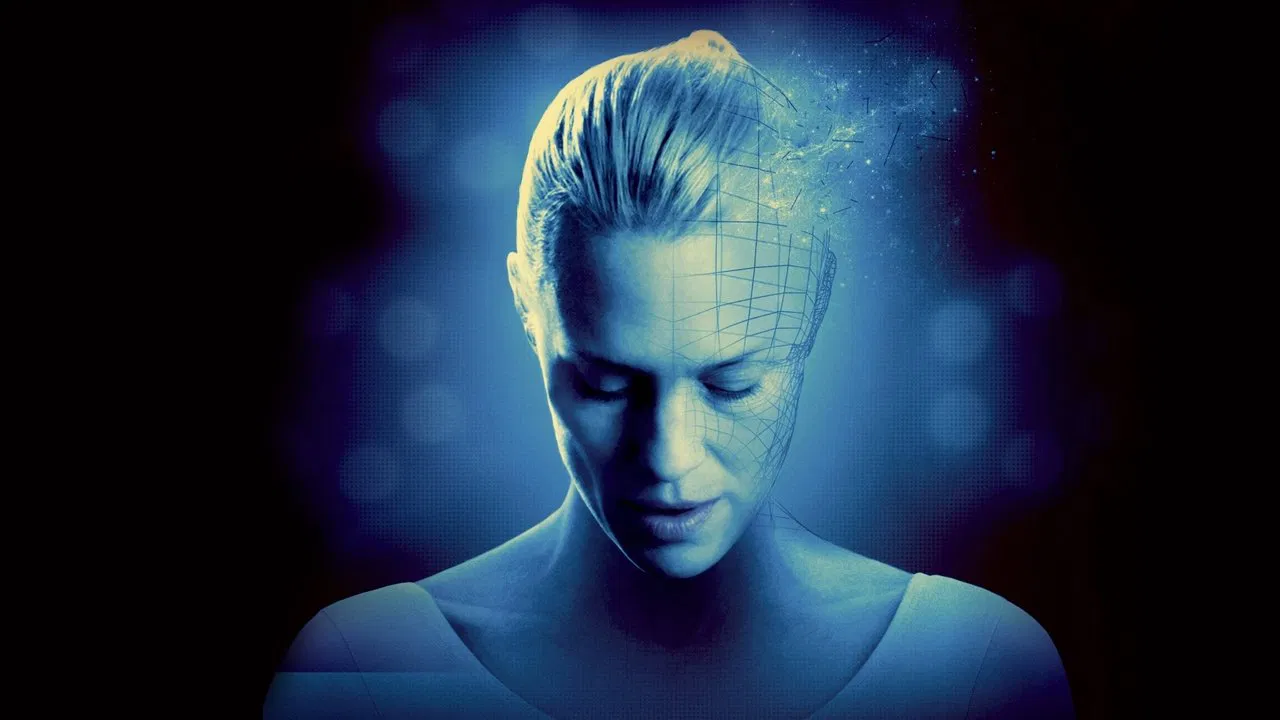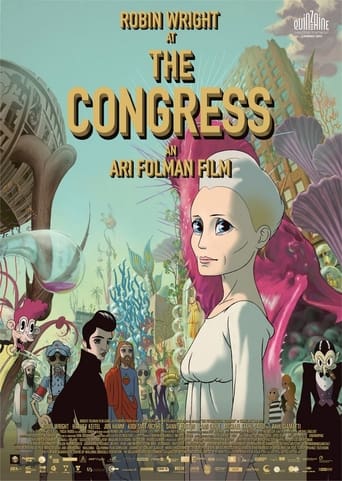Glucedee
It's hard to see any effort in the film. There's no comedy to speak of, no real drama and, worst of all.
Humbersi
The first must-see film of the year.
Raymond Sierra
The film may be flawed, but its message is not.
Kimball
Exactly the movie you think it is, but not the movie you want it to be.
Rectangular_businessman
After reading so many complaints posted on the web about the lack of originality in modern movies, one would think there would be a lot of support and praise towards a film that tries to do something different and unique, but it seems that complex (or merely unconventional) narratives are loathed here on IMDb. But then again, this is the same website that gives extremely inflated ratings to a lot of generic superhero flicks. It is also the only website where a show like "Mr. Pickles" could be rated so high.Anyway, "The Congress" is a wonderful film. Of all the movies that combined live-action with animation through the history of cinema, this might be my favorite. Plot-wise, "The Congress" might be closer to movies like "Inland Empire" rather than "Who Framed Roger Rabbit". And the balance between the live-action parts with the animation is simply excellent.Some people say that it would have been better if the "Hallucination" parts were done in live-action, but I disagree: The animation sequences (Which make a marvelous combination of psychedelia with an art style reminiscent of the work of Max Fleischer) not only gives the story a proper dream-like feel to the story (Opposed to a dry and forgettable portrayal of dreams as it was seen in movies like "Inception") but also serve as a subtle commentary about modern-day obsession with escapism: It's something admirably subtle the way the thin line between fantasy and reality fades away as the plot of the film progresses, until the bitter reality is finally showed in a rather heartbreaking manner. Like at the end of "Waltz with Bashir", when the animation changes into live-action, we as viewers are forced to confront a harsh reality that cannot be ignored, and that reality is that living with our backs turned to the problems of today only will have dire consequences in the future, and we will have to deal with those consequences in one way or another. I guess that a message like that could be hard to swallow for many viewers, but I personally think that in this day and age, a message like that it's more necessary than ever.I hope "The Congress" gets eventually vindicated by history. Maybe in the future, people will be able to appreciate more its daring qualities. For now at least, the future of cinema seems bleak, with all the same generic stuff making billions at the box office while the actually challenging movies are perpetually ignored. A shame, really.
Reinier De Vlaam
I got "the Congress" while looking for anime and what a stunning surprise it was. Visually stunning, well worked out characters and a very actual topic that raises questions about being and the power of pharmaceutics and media companies over people. But also about loss and making important choices. Now I admit that the start of the movie is a bit weak, flying kites (return theme) near an airport fence...well OK. The discussion about and the scanning, a bit long. But then the movies sets of... The graphics are a psychedelic trip like "yellow submarine" from the Beatles. You get confused on what is real and what is the relation is, until it all comes together...worth watching again
seanmft
A movie about movies; Pretentious, humorless, pseudo-art-house garbage. This film starts out with a scene in which Robin Wright's agent (Harvey Keitel) is reaming her out for all the bad movie choices she's made. It seems the plot (if there is a plot) exists only to validate that first speech with a bizarre kind of meta allegory damning Robin Wright's acting career. If that really was the intention, and not just a bit of accidental irony, then I give it two stars. I wanted to like this movie, and believe me I tried. The dialogue feels purposefully glib and awkward, so much so that I was waiting for it to tie in with the surreal nature of the subject, but it never does. The Congress is a film that questions reality so much that it fails to set up any foundation upon which questions can be asked. Not only are there no answers, which can make a film thought-provoking, but no meaningful questions. The result is something substantially less profound than your average Road Runner cartoon, and less entertaining than a documentary about documentaries. Images flash before your eyes, sounds pummel your ears, yet nothing of consequence ever happens. Your 2 hr and 2 min could be better spent watching a lava lamp.
Cd1083
Expectations for a film are very powerful. When we walk into a theater/put a disc into the player, we have an create an idea of what is in store. When the product delivered is different from our anticipations, our judgements can become skewed. Upon viewing the trailer for The Congress I believed I understood what the film was going to be about; after finishing the film, I have no idea what I just watched. The plot I understand, it's everything else that I'm still hazy on. The general idea of the film is that Robin Wright, playing herself, is given a final role. The role is to become a product. No longer allowed to act, Wright will only be seen on screen via her computer generated avatar. Her initial hesitation to this offer are obvious. Robin doesn't like the idea of a conglomerate film company controlling her image. This idealistic desire is immediately shot down by her agent as the film makes it important to note that Robin Wright's career has been a colossal failure. Every decision she has made is a bad one and her decision to decline this opportunity of a lifetime is just another example of it.Once Robin agrees to sell off her image for peanuts, she wants the process to take no longer than it has to and requests the scanning process be completed right away. Despite her forceful request, she still acts reluctant to have the procedure. This indecisiveness is prevalent throughout the film as we're never quite sure what her priorities are. What does Robin want? She says that she wants to save her son. Even the trailer puts the plot point as a primary objective, but that case isn't made very clear during most of the story. There are moments here and there where she reminds us all, but the film puts the sizzle before the steak and that ends up being its defining flaw. There ends up being an important moral message at the core of the film. It's not until the end that we even get an inkling of what it's trying to say, but it's there nonetheless. The Congress does a good job early on building likable characters within Robin's family. We learn that her son, Aaron, has a disease that is slowly deteriorating his vision and hearing. We are also introduced to Robin's 'daughter', who inexplicably disappears a third of the way into the movie. The only character established early on who remains one of relevance is "Miramount" studio executive and antagonist, Jeff Green. Instead of further fleshing out these characters, we are given an out of this world experience that becomes far too bizarre for most to grasp on a single viewing.The film is directed by Ari Folman and was loosely adapted from a 1971 Science-Fiction novel, "The Futurological Congress." Folman is someone I wasn't familiar with prior to now. His prior films were non- English documentaries and even this film is not considered an American film as it was first released over in Europe. Folman's approach for the Congress is what many could consider avante-garde, despite the fact that it's really not presenting anything new. The hybrid live-action/animation film has been done many times before (Roger Rabbit, Cool World, Looney Tunes) and the alternate state of mind film has been done before. (The Matrix, Inception, Trance) The Congress attempts to do them together and it mostly succeeds. Mostly. Visually, the film is remarkable. From the very beginning, before the animation kicks in, the colors and lighting are amazing. The colors pop from the screen and cinematically the film draws you in for something you know is going to be special. Once we transition over into the 'alternate' state of being, the sophisticated beauty is replaced with a uncanny callback to classic cartoons of day's past. The idea being that the experience is unique to each person who implies Robin's experience is a reflection of her childhood surrounded by traditionally animation while a younger individual may create a world of CGI. I'm interested in watching more behind the scenes of the film, if only to learn more about how it was created. How have the technologies advanced from earlier films with similar visual styles.When a film features a cast of Robin Wright, Paul Giamatti, Harvey Keitel, and Jon Hamm I would expect the acting to be in the bag. While the plot does a good job of creating characters I want to get to know, the dialog is dull and apathetic. It's almost as if everybody lost a bet and was forced to do this film pro-bono. The moment Robin steps inside the world of animation for the first time, her attitude approaches apathy. She acknowledges the novelty of it as if she were looking at a caricature of herself at the state fair instead of living it out. This lack of interest in the world she inhabits is infective as I felt the same wayThe Congress is one of those films I absolutely will have to watch again in order to have a true opinion of the quality. The disjointed nature made it difficult to follow and boring at times. I found myself not caring about what happened. It felt more like a tour inside the world it created instead of a story being told. The end felt rushed if only because I didn't know where we were going. So when we arrived I was surprised at where we ended up. Despite my overwhelming criticisms of the film, I love the premise and visuals enough that I'd be able to view it again in order to gain a better understanding of the message being told.Read this and my other reviews at CD1083.com

